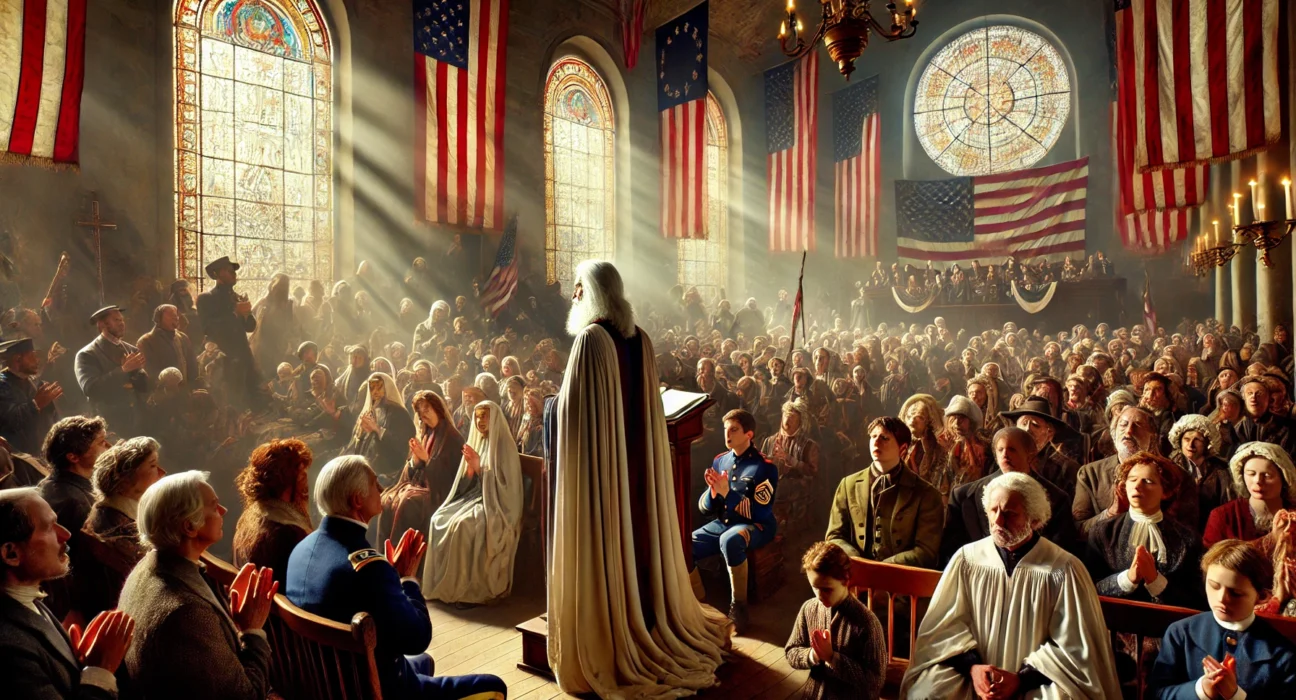“The War Prayer,” a short story by Mark Twain, was published posthumously in 1916. Twain, known for his sharp wit and incisive satire, uses this narrative to critique the blind patriotism and moral contradictions inherent in war. The story is set during a time of great nationalistic fervor, where a country is swept up in the excitement and pride of sending its young men off to battle. Through vivid imagery and poignant dialogue, Twain exposes the darker, often unspoken aspects of war and the prayers for victory. The narrative centers around a fervent church service where the congregation prays for success in battle, only to be interrupted by a mysterious stranger with a divine message that forces them to confront the true cost of their desires.
Plot Summary
It was a time of great excitement. The country was at war, and the spirit of patriotism burned brightly in every heart. Everywhere, there was the clamor of drums, the joyous blare of brass bands, and the sharp cracks of toy pistols. Flags fluttered from rooftops, and firecrackers hissed and popped on the streets. Young volunteers, dressed in their freshly pressed uniforms, marched proudly through town, cheered on by mothers, fathers, sisters, and sweethearts. Their faces shone with pride and anticipation, their minds filled with dreams of heroic deeds on the battlefield. Each night, mass meetings gathered to hear the fiery speeches of patriot orators, and tears of pride flowed freely as the people applauded. The nation stood united, hearts ablaze with the righteousness of their cause.
Even in the churches, the fervor was unrelenting. Pastors spoke with intense conviction, invoking divine favor to bless their soldiers, shield them from harm, and ensure their victory in the righteous fight. Few dared question the war. Those who did found themselves swiftly silenced, for it was dangerous to speak against the glory and justice of the nation’s cause. Doubt had no place; questioning the righteousness of the war was akin to blasphemy.
Sunday morning arrived, the day before the battalions were to march to the front. The church was packed, filled with families, neighbors, and, most importantly, the young soldiers. Their faces glowed with excitement as they imagined the battles to come: the rush of the charge, the clashing of sabers, the fleeing of their enemies. They saw themselves returning as heroes, bronzed by the sun, welcomed back with cheers and praise, covered in glory.
The families of the soldiers were filled with pride and envy. They watched the volunteers with shining eyes, their hearts swelling at the thought of their loved ones returning as heroes. Meanwhile, the neighbors and friends who had no sons or brothers to send to battle could only watch in admiration, secretly wishing for a similar honor.
The service began with a reading from the Old Testament, one of the many chapters devoted to war. The congregation listened with rapt attention, feeling the weight of divine righteousness on their side. Then came the prayers. First, the short prayer: a plea for divine blessing on the soldiers and a prayer for strength, protection, and triumph. The words were spoken with such fervor that the walls of the church seemed to hum with it.
Then followed the long prayer. The minister, with eyes closed, implored the Almighty with words so passionate, so filled with beauty, that the congregation was moved to tears. He prayed for the soldiers, asking for divine guidance in battle, courage, and strength. He asked for protection from harm and pleaded for victory, for the honor and glory of their nation.
As the congregation bowed their heads in reverence, something unusual happened. An aged stranger entered the church, moving quietly but with a presence that commanded attention. His robe flowed to the floor, his white hair cascaded down his shoulders, and his face was pale—so pale it was almost ghostly. He made his way silently down the main aisle, his eyes fixed on the minister.
Reaching the pulpit, the stranger stood beside the preacher, waiting. The minister, eyes still closed in fervent prayer, did not notice him at first. When he finished with a final plea for victory, he opened his eyes to find the stranger at his side.
The man touched the minister’s arm gently, motioning for him to step aside. Startled, the minister complied, and the stranger took his place. The congregation watched in stunned silence as the aged man surveyed them with solemn, burning eyes.
He told the congregation that he had come from the Throne, bearing a message from the Almighty. His presence sent a ripple of shock through the audience, but he paid no mind to their reactions. His gaze remained calm and unwavering as he explained that their prayer had reached the heavens, and the Almighty had heard it. He told them their prayer for victory had been granted, but there was more to consider.
Victory, he said, carried many unspoken consequences. When they prayed for triumph on the battlefield, they were also praying for death and destruction. They had asked for victory, but they had also asked for their enemies to be torn apart by shells, for their lands to be littered with the bodies of the dead. They had prayed for the agony of the wounded, for widows to weep over husbands who would never return. They had prayed for children to wander through desolation, homeless and starving, broken in spirit. All of these consequences, he explained, were part of the victory they sought.
The congregation sat frozen, the weight of the stranger’s words pressing down on them. The reality of what they had asked for—the true price of victory—was now clear.
The stranger stood before them, giving them the choice. If they still desired victory, they need only speak. He, as the messenger of the Most High, was waiting.
But the church remained silent. No one spoke. The enormity of the unspoken prayer, now laid bare, filled the room. After a pause, the stranger turned and walked out, leaving behind a congregation that was forever changed by the revelation of what they had unknowingly asked for.
Later, it was said that the stranger must have been a madman. For surely, there was no sense in the things he had spoken.
Main Characters
The Minister: A symbol of conventional morality and religious fervor, the minister leads the congregation in prayer, asking for God’s blessing on their soldiers. He represents the blind support of war under the guise of righteousness, unknowingly praying for destruction along with victory.
The Aged Stranger: This mysterious figure delivers a chilling message. He acts as a divine messenger, illuminating the unspoken consequences of the town’s prayer for victory. The stranger’s solemn presence and his grim speech reveal the hidden, violent reality of what they are truly asking for.
The Congregation: Representing society as a whole, the congregation is swept up in patriotic zeal. They symbolize the masses who, in their desire for national pride and victory, fail to recognize the human suffering that accompanies war. Their unquestioning approval of the minister’s prayer contrasts with their discomfort upon hearing the stranger’s message.
Theme
The Hypocrisy of War and Patriotism: Twain deftly illustrates the moral contradiction between the glorification of war and the true horrors it entails. While the town is swept up in patriotic fervor, blindly asking for victory, they are ignorant of the pain and suffering they are implicitly endorsing. This theme critiques the moral blindness that often accompanies war fever, where nationalistic pride overshadows empathy for human life.
Religious Irony: The use of prayer in the story serves as a sharp critique of how religion is often used to justify violence. The minister’s prayer, supposedly invoking divine protection, masks a more sinister plea for the destruction of enemies. The stranger’s words expose the irony and hypocrisy in praying for peace and victory while causing suffering.
The Silent Prayer: The motif of the “unspoken prayer” highlights how individuals can unknowingly or unconsciously wish for something far darker than they realize. Twain uses this device to suggest that behind every patriotic or moral justification of war lies a hidden and much darker desire for violence and domination.
Writing Style and Tone
Mark Twain employs a masterful combination of satire and irony throughout The War Prayer. The story begins with almost celebratory descriptions of the town’s fervor for war, utilizing vivid imagery to depict the parades and enthusiasm. Yet, beneath this seemingly jubilant tone, there is a searing critique of the blindness that accompanies such fervor. Twain’s use of irony is most pronounced when the minister prays for victory, an act that the townspeople believe to be righteous but which the stranger reveals as bloodthirsty. This contrast between the spoken and unspoken prayers adds a layer of moral complexity to the narrative.
The tone shifts dramatically with the entrance of the aged stranger. His solemn, almost otherworldly presence and grim revelations cast a shadow over the previous jubilant scenes. Twain uses the stranger’s speech to deliver the moral core of the story, employing formal and biblical language to give weight to his message. This shift in tone underscores the gravity of the unspoken consequences of war, creating a stark juxtaposition between the lighthearted patriotism of the townspeople and the harsh reality they ignore.
We hope this summary has sparked your interest and would appreciate you following Celsius 233 on social media:
There’s a treasure trove of other fascinating book summaries waiting for you. Check out our collection of stories that inspire, thrill, and provoke thought, just like this one by checking out the Book Shelf or the Library
Remember, while our summaries capture the essence, they can never replace the full experience of reading the book. If this summary intrigued you, consider diving into the complete story – buy the book and immerse yourself in the author’s original work.
If you want to request a book summary, click here.
When Saurabh is not working/watching football/reading books/traveling, you can reach him via Twitter/X, LinkedIn, or Threads
Restart reading!








